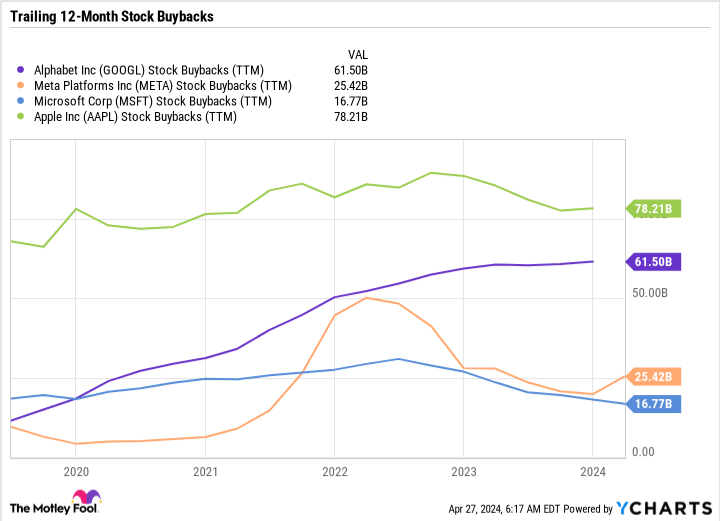Alphabet is still a great value, even after nearly doubling over the last 16 months.
Just one quarter after Meta Platforms announced its first-ever dividend payout, Alphabet (GOOG 0.32%) (GOOGL 0.37%) joined Meta, Microsoft, and Apple to become the fourth “Magnificent Seven” company to reward shareholders with a quarterly dividend. Nvidia technically pays one too, but at a negligible 0.02% yield, it’s a nonfactor to investors.
Alphabet’s dividend will start at just $0.20 per share, but the company said it intends to sustain this quarterly payout into the future, meaning it could build off this initial level.
At a share price of about $166 as of this writing, Alphabet’s forward yield is 0.5%, on par with its Magnificent Seven peers.
Let’s discuss why dividends matter for big-tech companies and the other way Alphabet plans to directly reward its shareholders.

Image source: Getty Images.
Two big ways to return capital to shareholders
Despite yielding just 0.8%, Microsoft pays out more cash in dividends than any other U.S.-based company: $20.7 billion in the past year. The company with the second largest amount of dividends paid is Apple at $15.1 billion. Meta’s dividend expense should be about $5.1 billion in its first year, while Alphabet will pay out just shy of $10 billion.
That adds up to a combined $50 billion paid out annually to shareholders between the four companies. While that’s a massive amount of capital, these companies tend to spend even more on stock buybacks.
Data by YCharts.
Using profits to repurchase shares, even when the stock is trading near an all-time high, can benefit shareholders more than dividends in the long run. Shareholders owe taxes on dividend income but not buybacks. The latter also reduces the outstanding share count, increasing earnings per share and decreasing the company’s dividend liability over time.
Focus on the capital return yield rather than dividend yield
Dividends matter for mature growth stocks like Alphabet because they make the company a complete investment. The $0.80 per share in annual dividends looks trivial when Alphabet stock has nearly doubled since the start of 2023. However, a company’s ability to pay a growing dividend and buy back stock when market sentiment is negative can be a reassuring and effective use of capital.
It’s also worth mentioning that Alphabet’s dividend could be way higher if it didn’t buy back stock. Alphabet’s board just authorized a $70 billion buyback program. Annualizing its $15.7 billion of share repurchases from the first quarter and adding the $10 billion of expected dividends results in a total of $72.8 billion going to its capital return program. That’s good for a capital return yield of 3.4%, a much more generous yield than the dividend alone. This is the case for Meta, Microsoft, and Apple as well.
Accounting for the full capital return program, not just dividends, better illustrates how much companies like Alphabet are returning to their shareholders.
The complete package
With a market capitalization measured in the trillions, it’s hard to believe a company as big as Alphabet can continue to outperform the broad market. But once you consider all the advantages of big tech companies, it’s clear why the trend can continue.
Unlike a stodgy dividend-paying company with limited growth prospects, Alphabet is a high-margin business with an excellent balance sheet. It has plenty of avenues to expand existing cash cows like YouTube, Google Search, Google Cloud, and Android, or invest in new opportunities like artificial intelligence.
Even after a strong rally the past year, Alphabet trades at a 25.5 price-to-earnings ratio compared to 24.8 for the S&P 500. Future earnings growth, paired with buybacks, could lead to Alphabet once again trading at a discount to the broad market index.
The recent decision from Alphabet and Meta to start paying dividends marks a new age for big tech. Hovering near its all-time high, Alphabet remains a buy.
Suzanne Frey, an executive at Alphabet, is a member of The Motley Fool’s board of directors. Randi Zuckerberg, a former director of market development and spokeswoman for Facebook and sister to Meta Platforms CEO Mark Zuckerberg, is a member of The Motley Fool’s board of directors. Daniel Foelber has no position in any of the stocks mentioned. The Motley Fool has positions in and recommends Alphabet, Apple, Meta Platforms, Microsoft, and Nvidia. The Motley Fool recommends the following options: long January 2026 $395 calls on Microsoft and short January 2026 $405 calls on Microsoft. The Motley Fool has a disclosure policy.


